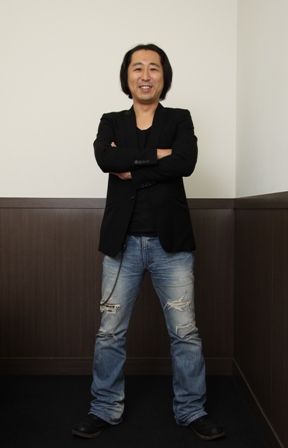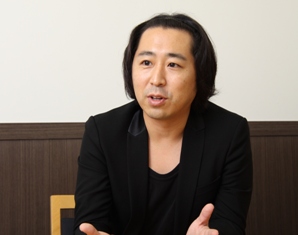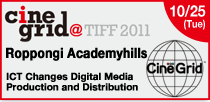Japanese Eyes “About the Pink Sky” interview with Keiichi Kobayashi (Director)

In “About the Pink Sky,” director Keiichi Kobayashi takes on the genre of “teen films” with a new perspective. Reminiscent of the French New Wave films of the 1960s, the rambling narrative follows Izumi (Ai Ikeda) and a pair of her girlfriends against a suburban backdrop. The film is shot in black and white.
— Why black and white?
Director Keiichi Kobayashi:The film is structured in such a way that what you see is a recollection, remembered by the main character in 2035. Therefore this is a memory from the past. The present doesn’t last. It keeps changing, right? The present turns into the past right away, every second. Because it’s the past it’s in black and white.
— It even looks a bit old-fashioned. Black and white also makes us look at the world differently.
Director:What you’re looking at right now turns into the past, as I said earlier. And to live can only be recognized through death, I feel. I wanted to share that in a very soft way through this film. In the film there’s a part where they write a newspaper article by introducing different faces in the town. And they walk around looking for such faces – and just like that, looking at your town or a landscape in a different way, i.e. in this case in black and white, it brings you a new perspective. That’s what I tried to do.
— Speaking of new perspectives, this story is a teenage story. On the Japanese commercial screen there are many many teenage stories. What attracted you to this kind of film and what do you hope to add to the genre of teenage film.
Director:Well, you’re right, there are many films with teenage players in them. Because of that I wanted to challenge the genre. When I looked at films by other filmmakers I often wondered why they make such films, many of which look back nostalgically at youth. I wanted to make something that’s not a recollection of youth, but rather something that suggests different ways of living to teenagers and that’s why I chose teenagers. Also in other films of the genre they tend to focus on the shining moments of youth, for example. But again, I like to suggest a different way of life through the main character, Izumi, who looks at the world through her own eyes but in the film doesn’t take action, at least not much voluntarily, and towards the end she tries to take a small step. That’s the last scene. Whether or not that touches people’s hearts, I don’t know, but I tried to show, through her first action, her change and growth. Also other films of the genre tend to focus on distance between people and how they wade through different types of relationships. Some get hurt and some do different things. But I didn’t want to do that. I wanted to focus on the theme of self-expression – how to express one’s self through what they do or say.
— I think the 3 girls have a natural feeling and chemistry. I think you have a very good eye and ear for how friends relate and their levels of power. Could you tell me about the script and how it developed? Did you talk with teenagers?
Director:I wrote it from scratch. I worked on it every night and I didn’t particularly listen to high schools students’ stories at all. But as I said earlier, it’s the kind of high school student I wanted to suggest. I had a more or less definite image of how that person would be, so it wasn’t all that difficult. It went smoothly. We did a lot of rehearsing. And we took about 20 takes, at least, per scene.

— Is Ai Ikeda a professional actress?
Director:Ai has an agent, but this was more or less the first time she acted.
— She’s great!
Director:Thank you! (in English)
— And the other two?
Director:All of them tried acting, more or less, for the first time. Reiko Fujiwara, the girl who’s the peacemaker, she did work as a gravure model, but she also didn’t have any acting experience. Nor did Ena Koshino, the tall one.
— And so, when you worked with them, was there any improvisation, or did you follow the script exactly?
Director:Well, it was true to the script. No improvisation. Although I did change some of the lines each morning after having done lots of rehearsals. If something just didn’t feel right we would change it that morning or add a new line or something. To be frank with you, I didn’t think they were on the level where they could pull off improvisation.
— But still, they were very good.
Director:Really? I’m so happy to hear that.
— You’ve made totally different genre films before “About the Pink Sky.” What inspired you to make this teenage story?
Director:The early films were just videos, not films. They weren’t things I really wanted to make. I did it for experience, therefore the content wasn’t something I particularly liked. So almost in reaction against that, I wanted to make a film in the way I wanted to. Although there is one wonderful thing I found through the making of those videos. That was to have met my producer, Mr. Harada.
— When I saw “About the Pink Sky” I saw things that reminded me of older films. Can you tell me what director, films or styles that may have influenced your filmmaking?
Director:Well, when I was working on the script I felt the entertainment element should definitely be there and that I learned from Kurosawa’s earlier films, his black and white period. At that time the screen had so much power and attraction to it and his characters were so full of like. Of course I can’t reach that kind of level presently, but I’d like to emulate that. Another master I have in mind is Kenji Mizoguchi. He, as you know, depicted women characters a lot. And I believe he often depicted his ideal women characters in his films. That influenced me. And as for the long takes that you see in the film, I wasn’t particularly thinking of Mizoguchi’s style, I just ended up not being able to cut, because I was drawn into the atmosphere of the action, of the world that they were creating. Actually, before we started shooting Hiroshi Harada, the producer and I went to visit of Mizoguchi’s grave on the anniversary of his death. We offered incense and prayed and asked him for his support for our film’s success, for a successful production. On the way back, I said to Mr. Harada, “We didn’t hear any words from him.” And then Mr. Harada pointed out that my pants’ zipper was completely open. And he said, “That must be the message from Kenji Mizoguchi saying you have to expose yourself totally in making this film.” So I feel I’ve put in everything I possibly can into this film.
Interviewed by Nicholas Vroman (Film writer)
About the Pink Sky












